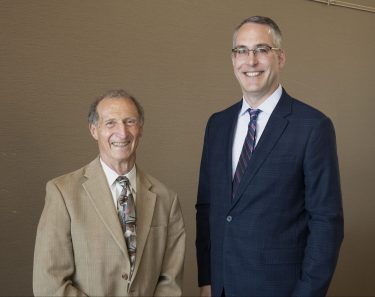Laurence Beck Named Inaugural Recipient of David J. Salant Professorship
On June 15, friends, colleagues, and family gathered in-person at the Hiebert Lounge as well as online to celebrate the installation of Laurence Beck, Jr., MD, PhD, associate professor of medicine and nephrology as the inaugural David J. Salant Professor of Nephrology.
 Drs. Salant and Beck
Drs. Salant and Beck
This newly established professorship honors David Salant, MBBCh, professor of medicine and vice chair of research for the department of medicine, for his many decades of research and clinical work.
In his introduction, David Coleman, MD, John Wade Professor and chair of medicine, hailed Beck as “an exemplary physician (and) scientist who excels as an investigator, clinician, and educator.” Coleman cited the groundbreaking discovery by Salant and Beck in finding the major antigen that causes the body’s immune system to attack its kidneys and for discovering a protein marker in excreted urine that simplified testing for this autoimmune kidney disease known as membranous nephropathy (MN).
Speaking at the ceremony, Jon Klein, MD, PhD, professor of medicine at the University of Louisville School of Medicine, said the publication of the Beck/Salant findings in the New England Journal of Medicine in 2009, “fundamentally changed the way we studied kidney disease.
“The result is that kidney disease diagnosis and treatment is more precise, and the diseases are better understood,” said Klein, whose team helped in analyzing the protein markers.
“He was ideal as a collaborator,” said Klein of Beck. “He was easy to work with, undeterred by setbacks, and I came to know him as a highly innovative thinker.”
Beck graduated from Harvard Medical School in 2000 and completed his residency and a clinical fellowship in nephrology at Boston Medical Center that included a research fellowship with Salant. He continues to do research in the BUSM Beck/Salant Lab.
Beck gave much credit to Salant for his success. “David demonstrated how to do science in a meticulous manner.”
Salant’s selflessness showed when he allowed his younger partner to take center stage and much of the credit for their joint discovery of the MN marker, Beck said.
“David let me take much of the credit for our joint discovery…He provided me with high-visibility talks at international conferences…and opened doors for me, both in academia and with some industry partners,” said Beck. “…It was his lead-by-example manner that really pushed me forward and made me perform at my highest, my best.”
The discovery of the MN antigen and the marker was the capstone of three decades of research by Salant, who is originally from South Africa and moved to Boston as a BUSM researcher in 1977, joining the nephrology faculty in 1979. He became a professor of medicine and chief of nephrology in 1988 and served in that capacity for 32 years.
“David has received from every organization that exists in nephrology, the top research award that they have to give, and it’s been richly deserved, as is the honor he’s receiving now from Boston University,” said William Couser, MD, affiliate professor of medicine and former head of nephrology at the University of Washington, who was a BUSM faculty member from 1972-82.
Many at the ceremony spoke of Salant as a “gentleman/physician,” noting his selflessness, his dual role as a physician and scientist and his status as a role model and mentor.
“He always prioritized the interests of others over his own and has worked tirelessly and unflinchingly for the common good,” said Couser.
“He was never seeking glory or recognition, but just the correct answers,” said Lara Dember, MD, a BUSM faculty member from 1996-2001 who now is director of the clinical research certificate program at the University of Pennsylvania Perelman School of Medicine’s Center for Clinical Epidemiology and Biostatistics.
“David shaped the careers of so many people, not only in this room, but throughout the world,” said Dember. “What I learned from Dave when I was a young faculty member has shaped, in so many ways, who I am as an academic and a physician.”
Salant deflected praise onto all the other researchers who had worked on the MN project, especially Beck.
“You were never really a trainee, but a partner in this venture,” said Salant. “I thank you for the time we’ve spent together. It’s been a pleasure and I hope we spend much more time together.”
View all posts